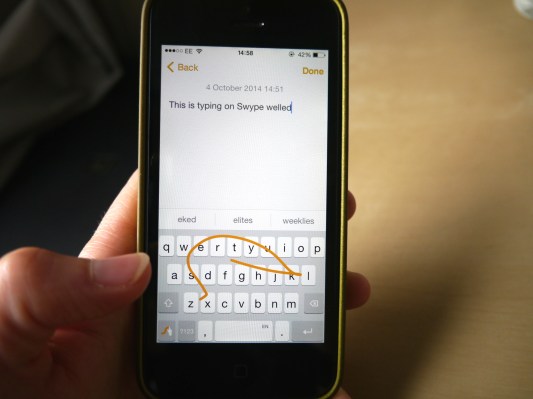The party is over for third party keyboards. But hey, it was fun while it lasted. Nuance, the company that acquired veteran swipe-to-type keyboard maker Swype — all the way back in 2011, shelling out a cool $100M — has ended development of its Swype+Dragon dictation Android and iOS apps.
The news was reported earlier by the Xda developer blog, which spotted a Reddit post by a user and says it got confirmation from Nuance that development for both the Android and iOS apps has been discontinued. We’ve also reached out to the company with questions. A search for the Swype app on iOS now results in suggestions for rival keyboard apps.
As Xda points out, Nuance has been concentrating on its b2b business using its speech recognition tech to enable speech to text utility — such as a dedicated version of its dictation product which is targeted at healthcare workers.
The b2b space also provides the business model that’s so often been lacking for keyboard players in the consumer space (even those with hundreds of millions of users — frankly, the typing was on the wall when major player Swiftkey took the exit route to Microsoft back in 2016).
The wider context here is that as speech recognition technologies have got better — improvements in turn made possible thanks to language models trained with data sucked up from keyboard inputs — voice interfaces can start to supplant keyboard-based input methods in more areas.
In the consumer space, Google especially has also doubled down on its own Gboard keyboard (which includes a dictation feature). While Apple’s native iOS keyboard is less fully featured but does include next-word prediction built in. So with mobile’s platform giants wading in there’s added survival pressure on third party keyboard app makers.
Nuance targeting its efforts at a narrow problem like patient documentation also makes sense because of the specialist nomenclature and routine procedures involved, which naturally provides a better framework for voice input accuracy vs more unpredictable and/or creative environments where dictation inaccuracies might more easily creep in.
So while Siri might still suck at understanding what you’re asking, a dedicated speech to text engine that’s been trained on medical data-sets and processes can provide compelling utility for clinicians needing to quickly capture patient notes, potentially even reducing inaccuracies that can creep in via old handwritten ways of doing things.
Connectivity getting embedded into more and more types of devices, including things that lack screens like (many) smart speakers, also means voice interfaces are naturally getting more uplift. And Nuance has been building dictation products for cars too, for example.
Still, it’s not quite the end of the road for third party consumer keyboard plays. VC backed freemium keyboard app Grammarly — which last year raised a whopping $110M, promising to improve your writing not just pick up typos but keylogging everything you type to do so — has been making a lot of noise and plastering its ads all over the Internet to drive consumer uptake. (My App Store search for Swype returned an ad for Grammarly as the top result, for example.)
And while the startup is taking revenue via a set of pricing plans for a more fully featured version of its service, its privacy policy also says its using typing data to improve its underlying algorithms and language models. So it remains to be seen what its data-mining keyboard business might evolve into (or exit to) in time.
Another consumer player, the Fleksy keyboard, also got revived last year — with a new developer team behind it, whose vision is for the keyboard to be a services platform. The team’s stated mission is to keep an independent and pro-privacy keyboard dream alive. So don’t stop typing just yet.
